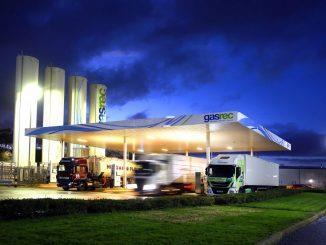
The Midlands will need 76 low and zero emission fuel refuelling stations by 2040 if it is to meet growing demand from operators in the region for alternative fuels and meet statutory zero carbon targets.
According to a recent study by think tank Midlands Connect, the region will need a maximum of 65 hydrogen refuelling stations and 11 CNG/LNG refuelling stations by 2040 just to service the Midlands HGV fleet.
The study, dubbed Alternative Fuels: Beyond Fossils, is calling for public sector intervention to speed up the roll out of a Midlands alternative fuel refuelling infrastructure and for the region’s logistics industry to be at the vanguard of the transition to low and zero emission fuels.
The cost of installing the infrastructure could be as high as £800m, says the study, which has identified 66 potential new locations throughout the Midlands for these refuelling sites.
However, the report warns: “‘We are witnessing a vicious cycle where a lack of recharging and refuelling infrastructure is resulting in limited vehicle take-up and vice-versa. We need the public sector to intervene, ‘break the cycle’ and inspire confidence and certainty for businesses.
“The availability of recharging infrastructure, availability of vehicles and financial incentives to help scale alternative fuels across the Midlands are the clear priorities for suppliers and operators.”
Its key recommendations are that Midlands hauliers lead on the adoption of alternative fuels, that the region’s road network be equipped with a recharging and refuelling infrastructure and that the Midlands becomes a knowledge hub for alternative fuels research and a test bed for innovative projects on alternatively fuelled vehicles and recharging and refuelling infrastructure.
Midlands Connect has also pledged to work with local authorities, industry and academia to create working groups dedicated to driving the roll out of the alternative fuels refuelling infrastructure and to drive alternative fuel adoption across the region.
Chief executive Maria Machancoses said: “Several firms in the Midlands are seeing the potential opportunities for alternative fuels in our future economy and some are already investing in hydrogen projects and trials. Our job, at Midlands Connect, is to support councils and the government to build the infrastructure needed for the region to be world leading in alternative fuel development.”
Midlands is already leading the charge with the opening of Tyseley Energy Park (TEP) near Birmingham last year. TEP is the UK’s first multi-fuel, open access, low and zero carbon refuelling station. It offers a 24/7 hydrogen, CNG, biodiesel and diesel refuelling service to commercial fleets, public transport fleets and private vehicles as well as EV charging options.
Speaking at Freight in the City’s recent Fleet Decarbonisation webinar, director David Horsfall said the company is looking to open more stations: “We now need to start developing strong baseload demand and long term contracts. We're probably around 30% capacity, we want to get to 100% utilisation, at which point we'll have confidence to build more of these stations,” he explained.
“Now more than ever, we need to keep building relationships with fleet operators, industry, SMEs and OEMs. We've got to break this vicious cycle around lack of refuelling infrastructure resulting in limited vehicle take up.”
To watch the Freight in the City Fleet Decarbonisation webinar go to https://tinyurl.com/2zmtvekt













